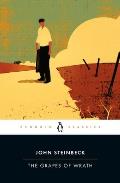This title has graced my "must read" list since high school. It took the decision by my book group to finally force me to pick it up and read it from cover to cover, and I was actually surprised to discover how much I enjoyed the story. I also happened to be in the middle of reading Atlas Shrugged when I picked it up in order to finish it in time for our discussion group. It turned out to be a nice balance to the sometimes heavy-handed economic philosophy preached by Rand.
Interestingly, the novel was written in only 93 sittings. In the novel, Steinbeck chronicles the forced exodus of the Joad family from their family farm in Oklahoma to the supposed "promised land" of California. The entire family (grandparents, children, spouses, siblings, etc.) makes the arduous journey in one car. Upon arriving in California they find jobs almost impossible to come by, unsanitary living conditions, unlivable wages, and the threat of starvation facing them daily.
Interspersed through the novel are chapters called "interchapters." These chapters break from the main storyline and paint a picture of a situation/place/issue. The leader of our discussion explained that the interchapters serve as the Greek chorus. In Greek plays, the Greek chorus always "offered a variety of background and summary information to help the audience follow the performance." For example, the first interchapter takes a look at a used-car lot and the shady business practices of the salesmen. The dialogue and narrative are blended in a way that is typical of American writing and has (I learned) been compared to jazz. I found these interchapters to be my favorite part of the book. They have almost a rhythmic, lyrical quality that I enjoyed (even though the content was depressing).
Steinbeck was uniquely prepared to write this book. He was a reporter and wrote on the conditions of the labor camps. He drove along Rt 66 from New York to California and saw the families migrating. His first-hand experience is apparent and he decidedly succeeds in engaging the reader's emotions and creating a visceral reaction to the trials of these families. Grapes of Wrath was referred to by FDR, it created a series of Senate inquiries into the conditions of the camps, and spurred Eleanor Roosevelt to actually visit the camps.
Steinbeck stated that, "I've done my damndest to rip a reader's nerves to rags, I don't want him satisfied ... I tried to write this book the way lives are being lived not the way books are written." He certainly succeeded. I was in a constant state of shock at how anyone could survive the conditions that the Joads face in their daily lives and how people could treat their fellow humans with such indignity and malice.
The people come with nets to fish for potatoes in the river, and the guards hold them back; they come in rattling cars to get the dumped oranges, but kerosene is sprayed. And they stand still and watch the potatoes float by, listen to the screaming pigs being killed in a ditch and covered with quicklime, watch the mountains of oranges slop down to a putrefying ooze; and in the eyes of the people there is the failure, and in the eyes of the hungry there is a growing wrath. In the souls of the people the grapes of wrath are filling and growing heavy, growing heavy for the vintage.

No comments:
Post a Comment